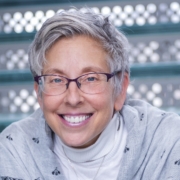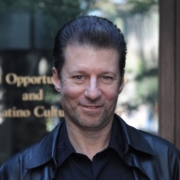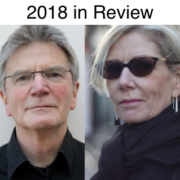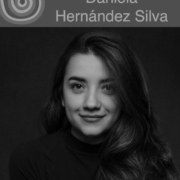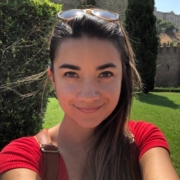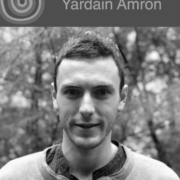Yardain Amron
Behind the Scenes: Education is Not the Silver Bullet
Today Yardain Amron joins me to talk about his FreshEd Flux episode, which aired last week. I recommend you listen to his Flux episode before listening to this interview. It’ll make a lot more sense!
In our conversation today, we talk about his process of creating podcasts and telling stories. He says he dwells on contradictions that often go unnoticed. Yardain also talks about the connections and tensions between his approach to storytelling as a journalist and his approach to academics as a master’s student. He worked through some of these tensions developing his Flux episode, which brought together many different stories into a coherent narrative connected to theory.
Yardain Amron is a freelance journalist and master’s student at the University of British Colombia.
Citation: Amron, Yardain, Interview with Will Brehm, FreshEd, 250, Podcast audio, August, 09, 2021. https://freshedpodcast.com/amron/
Will Brehm 0:34
Yardain Amron, welcome to FreshEd.
Yardain Amron 1:46
Thanks so much. Nice to be here Will.
Will Brehm 1:47
Congratulations on your Flux episode. It was really fantastic. I actually want to start today by asking you about a few of the characters that made an appearance in your episode. You actually started your whole story talking about Umar Khalid and his disappearance or the disappearance of Najeeb Ahmed. Can you tell me a little bit about Umar Khalid? Have you spoken to him since the show? And how is he doing today?
Yardain Amron 2:11
Yeah. The short answer is I don’t actually know. Umar is still in prison. He’s been in prison since September 2020. So, approaching a year. There’s two cases against him and he did get bail on one of them, but the other is still pending. So, he can speak to his parents, I believe, once a week or his family. There was an op-ed that came out that he wrote from prison a few weeks ago. I did see a video of him moving through the courts and he sort of smiled and put his fist up. So, there’s these little hints of how he’s doing and the strength that he can at least show publicly in the moments that he’s in front of cameras, but I don’t know how he’s doing personally or mentally or physically exactly. And he’s not the only one either. You know, there’s a whole list of other students, his peers, from JNU (Jawaharlal Nehru University) in Delhi, and from other schools that have been imprisoned for their activism. Also, scholars and journalists. Some journalists have been murdered over the past number of years as well. As well as some students who’ve taken their own lives. And so, it’s just entering that space, the stakes are extremely high. And Najib is the case in point of a loss that still is being fought for today. The point I guess just is the violence. I think that that was one of the things that I was trying to forefront in the story.
Will Brehm 3:32
The violence, the struggle by these student activists. What’s interesting is recently, The Guardian and a few other news agencies put out this big story on this spyware of activists in places like India for some program called Pegasus. And my immediate thought was actually of Umar and Najib. Perhaps they were being followed and spied on because of their activism. It just made me realize what was at stake for them.
Yardain Amron 4:01
Yeah. You’re reminding me of when I was going to the courts and following Najib’s case. There was a whole side -one of the big stories was around Najib’s phone, was around the phone of the students who were accused of beating him up who people thought were the ones who disappeared him. And there was all this hubbub of trying to track them and trying to get them to special labs for them to be analyzed. I don’t know enough about this Pegasus story yet, and is a big piece of what these different activists deal with for sure, because they do have to be in contact with each other in some ways.
Will Brehm 4:35
And your story brings together activists, sort of, across the world in places that aren’t normally let’s say, compared. So, how did you actually bring together these really disconnected places and disconnected people into your podcast, into a single story? How did the idea even come about?
Yardain Amron 4:53
It’s a good question. I’ve never done a story like this before. Usually, the place or the moment sort of creates the story and I just have to be in that space, talk to all the different sources and characters that I might find along the way. And this one was definitely more an idea that then produced sort of a line of breadcrumbs that I’ve followed. And it started with all of this reporting that I had done on Najib’s case back in 2017, that I just been sitting on and feeling really kind of guilty about because I had taken so many people’s time on campus and the family and when the case sort of fell apart and I didn’t feel like there was much use, or I didn’t know what to do with the work, it sort of just started collecting dust. And then I don’t know, I started seeing connections between Najib’s case, between when Umar was arrested, and student activism in other parts of the world. I just was looking for threads and debt became sort of an angle in that allowed me to just learn something new about the ways that education sort of impacts different parts of the world in different ways.
Will Brehm 6:09
When did you realize that was sort of the way in to these disparate stories to these breadcrumbs that you were trying to connect?
Yardain Amron 6:17
I’m in grad school, obviously, that’s why I’m here. In my first term of grad school, we read a book by Hannah Appel (who’s in the episode) called The Licit Life of Capitalism, which is about the oil industry in Papua New Guinea. And debt isn’t actually a central object in that book, but Appel is a co-founder of The Debt Collective and I think that her work that I stumbled upon, then I read a different book in a different class on imperialism, called Killing the Host by Michael Hudson, which is about the financial collapse of 2008, and rentier capitalism.
Will Brehm 6:54
To me, so what you’re sort of saying is that you had this interview with Umar about Najib in India. And then here you are sitting in grad school reading all of these different books and debt becomes sort of this strand that comes out of these different books. I mean, Michael Hudson talks about it, not only about the global financial crisis, but also historically all the way back to the Jubilees, which I think you even mention in your episode. And so, you then have this idea, as you said, and you ended up creating a story and reporting a story around that idea, rather than seeing where the story led you. I mean, it’s an interesting change of approach, as you said earlier,
Yardain Amron 7:38
Yeah. I think that’s exactly right. It’s an idea that I hadn’t, before that point, really thought about or seen too much of in the mainstream discourse. And I think that was one of the compelling factors that pulled me towards it. Is it doesn’t seem, it is so pervasive, it is so debilitating for those who experience it. And it also gets at, I think, one of these debates that happens on the left a lot that is itself quite debilitating between the Marxists and the feminists or between thinking about -maybe that’s the wrong framework- but between thinking about the world through an economic lens or through a class lens, or in thinking about it through a racial lens. And I think debt, in some ways, as far as what I’ve read, it might seem like that’s more of the economic side but it’s really this framework that brings these spaces together. That’s the way we need to start thinking about these two concepts together.
Will Brehm 8:40
What’s so interesting to me, Yardain, is that by talking about debt, and to me, you’re sort of talking about it in your episode as a social relationship among people and in these social relationships there’s issues of class, and issues of race, and issues of gender. But ultimately, you see through this structural violence. To you in a way, or at least the way I listened to the story is that it’s through issues of debt and relationships of debt where you see violence occurring.
Yardain Amron 9:10
Exactly. I’ve been thinking a lot about violence and just the ways that I don’t see it in certain contexts. And in other contexts, it’s so obvious and over and easily talked about to the point where it might even be dissociated from or sort of nonchalantly, “Yeah, that’s just the way the world works”, sort of framed. And I think debt is this one form of violence that actually isn’t even considered violent at all typically, it’s just as David Graeber talks about in the little piece that I quote in the story, it’s supposedly just a moral relation, that’s all it is. And the trickery of that framework and how it’s become so commonsensical to think about debt that way I think is something we should be problematizing more. And that’s, I think, one of the impetuses of what brought me to the story in this form.
Will Brehm 10:07
Did you have student debt growing up?
Yardain Amron 10:09
I didn’t. I probably would not be talking to you right now if I did. Seriously, I mean that wholeheartedly. I think that I wouldn’t be a journalist if I had student debt. I wouldn’t have had the capacity to freelance. I wouldn’t have been able to trust myself or trust the world to not jump on the wheel right after I finished my undergraduate degree and try and make it in an already collapsing industry. Which, let me tell you, it’s not easy. And there’s lots of side gigs and definitely not enough support, oftentimes. Or it’s just very cut-throat out there. But the point being that, yeah, I think that the fact that I have had the privilege in this rare or very small minority group of people who can come out of a degree these days, especially in the West, without debt. It’s striking to me how perhaps easily it is for me to forget that fact, sometimes. And I think that this story has brought it to the forefront again, and again, and again,
Will Brehm 11:16
I was gonna say, it’s a fascinating story that you have of your own personal relationship to debt, or not having a relationship to debt. In many ways, I’m similar in a way. And if you don’t have student debt, it’s easy not to think about it, because it doesn’t sort of dominate every decision you make. And it gives you this freedom to explore and do things that perhaps you otherwise wouldn’t have done. Or perhaps you would have made different decisions based on that debt. So, it’s a really interesting sort of reflection you’re giving and then saying how it has become so important to you through some of your recent studies. And so now today, you are doing your master’s degree of critical geography in Vancouver, and you previously were a journalist, or still are a journalist. I guess one of the questions I have is, how do you navigate sort of these two different spaces being a master student in academia, while also being an active radio journalist?
Yardain Amron 12:15
It’s definitely been tricky. There’s been a steep learning curve, I think, having been steeped in story so intensely over the past many, I don’t know, six, seven years. And I really do believe in story. I think it’s fundamental to the ways we understand the world and connect and relate to each other. And it’s not that story doesn’t exist within academia, of course, it does. I think that the emphasis though, is shifted slightly, at least within human geography, the department that I am, on “Okay, well, what is your theoretical framework? What is your question?” What is the project that resonates with me is the gut way that I would approach figuring out what the project is? And my supervisors have said, “Well, what’s your question? Who are your thinkers that you want to work with?” That’s not a process that I’m as comfortable with yet but it’s one that I think is actually probably super important for journalists to consider because all of that stuff lies nascent or hidden, potentially, within the field of journalism as well. And I think oftentimes, something that has bothered me as a journalist is just the taken-for-grantedness of story as like, okay, that’s automatically good. And I don’t think that’s true. I think that it’s extractive as well. And that has to also be part of the equation when we think about what we’re doing.
Will Brehm 13:50
Do you think the Flux episode was sort of a beginning for you in a way of sort of combining both your emerging growing academic side in the field of human geography with that sort of strong journalistic background that you have focused on story?
Yardain Amron 14:07
I think it’s been the most explicit moment of practice for this combination for me. I’ve definitely attempted to do it in previous stories that I’ve produced. But you and Jo have pushed me again and again and again, to bring more analysis to bring more questions to read this, watch that, and I think that the dividends of that have paid off in a number of different interesting ways with this story. Yeah, it’s a balancing act between you don’t want to weigh everything down with too much theory or too much abstraction. And at the same time, if you stick within the frame of narrative or plot too intensively you can get to the end and be like, “Well, that was interesting, but what’s the takeaway?”
Will Brehm 15:01
I mean, I must say, Jo and I, when we were listening to your original pitch, and then we ended up Googling you and finding another podcast that you created previously, one of the things that struck us was just how you have such a skill of talking about these really big ideas without ever mentioning it. Like using story to bring to life something like structural violence, which in the Flux episode, you actually never mentioned. You don’t actually say structural violence, I don’t think. How do you do that by the way? I mean, it’s such a skill to have.
Yardain Amron 15:36
It’s true. I don’t know. Maybe I just don’t have the language to do it. So, it’s easier. I don’t have all the academic jargon yet.
Will Brehm 15:45
Do you have an understanding that that is what you are doing? Or is it just how you approach stories?
Yardain Amron 15:50
Um, I don’t know. I’m thinking about the story you’re mentioning and it’s interesting. When I thought that this story was going to start with a connection to the story I was working on at the time because that was part of the process. There was this story that I originally had gone to India to produce about bonded labor, about debt in the brick industry in one of the worst forms of debt slavery, of debt bondage in the world. And I was working on that story when Najib disappeared. And when I was talking to Umar, and when I was going to campus to JNU and trying to figure out what had happened. And at the time, those two were totally disconnected in my mind. That was this was the story that I was finishing, and this was another one that I was beginning. And it took me years, actually, for the connections between these two disparate stories to start bridging in my head. And the point that I’m getting at is there’s a gut sort of motive that sort of makes those connections.
Will Brehm 16:53
It’s interesting, you’re sort of making these connections as you do this reporting. I guess, for up-and-coming podcasters or future Flux fellows, people might be wondering, like, how do you know when you have a story that needs to be told? Like, is there a moment for you, then it’s like, “Ah, this is it? I’m gonna really dive into this issue of debt, for instance in this Flux episode?”
Yardain Amron 17:16
Yeah, it’s a really good question. I forget where I learned this, I must have either read it or listen to it somewhere. But one of the things I look for in stories is for contradictions. Where is there some tension manifesting in a space? And why or how is it potentially being ignored or invisiblized? So, for instance, with the debt story, we can think about the fact that there’s this totally taken for granted, understanding that a debt must be repaid. There’s no option. If you took out the money, you have the obligation to pay it back. David Graeber mentions this. At the same time, the fact that if you ask someone what they feel about a moneylender, they’ll say, “Oh, that’s a terrible profession,” you know. And there’s a connection there to Judaism as well but the point being that that’s a contradiction that, to me, is very specific, but it’s a seed for a potential whole realm of new understanding about a space.
Will Brehm 18:17
So, it’s like find the contradiction and then begin to dwell in it and see what comes out?
Yardain Amron 18:21
Exactly. This is I think, it’s not just for creating stories or for doing this kind of research. But dwelling in contradiction is probably a good philosophy for just trying to live a little happier, you know. If I’m always trying to resolve contradictions, it’s not gonna work out. Or in my experience, it hasn’t, at least so far.
Will Brehm 18:43
And I guess, as a journalist, or as an academic, the struggle then is how do you articulate these contradictions without showing an answer to them, but sort of revealing their complexity and raising further questions in a way that you didn’t have at the beginning?
Yardain Amron 18:59
Yeah. And the stakes, I think, are also a piece of the contradiction, right? You know, I’ve mentioned it but the stakes here are really high. I think that’s something that I always struggle with. The stories that I tend to work on are ones where violence is really prevalent, and I think I’m always wary of -especially with audience- I’m aware of the fact that this is a story that takes place in multiple parts of the world. And I don’t exactly know the listenership for this story, but I imagine that there aren’t as many listeners in India as there are in Europe or North America, though I could be wrong. But I worry about the ways that the people that I have met, and the stories that they’ve told me in trust are then presented by me and then perceived and understood by whoever’s listening in ways that I know as a listener of radio, as a consumer of news, that it can be very alienating just with the sheer quantity that’s out there. You know, how fast the new cycle is. And how do we pause to potentially take in something? And I don’t think that there’s an answer to it. It’s another contradiction, right? Like the structure is powerful, is violent. And I imagine it sometimes as a vortex that we’re just sort of spinning around. And we do our best, or I do my best, but it’s scary sometimes to think about the fact that these stakes can be potentially diminished in someone’s mind just because it’s not their story, because there’s so much violence out there.
Will Brehm 20:40
So, Yardain, you end your episode, with a major critique of education as being a panacea, which many people assume to be true. Or maybe if they don’t even assume it, it’s latent in their thinking. And I would imagine, it’s not that popular of an idea to say that it’s not a panacea. I’m interested in how you came to this idea and wanted to discuss it in the podcast. How did you come to this idea that education might not be all that we assume it to be?
Yardain Amron 21:12
Maybe another place that I find a lot of stories, just because of the political context that I am in, is through a lot of my liberal family. And in conversations with many of them over the last number of years, there’s certain pathways that conversations go if you get into it really intense, whether it be political, philosophical conversation. And one way is they tend to go to this argument of, people will be familiar with the population argument where -I think I even mentioned this in the story at some point- at the end of the day, it comes down to population. There’s too many people in the world. And you hear that, and it seems like a really bulletproof argument until you start poking into it and piecing it apart and seeing the contradictions even. And then on the flip side of that coin, I oftentimes would hear something like, “Well, and the solution is education”. And I think it’s just a really oversimplified and romantic vision of what education is. No institution has shaped me more in my lifetime than education obvious or maybe not obvious. But to me, obviously. And since getting my undergrad, if I’ve had a mindset, it’s been unlearning and uprooting sort of a lot of the lessons that I’ve inculcated perhaps unconsciously and consciously through that institution. And I think it’s just really important that the institution isn’t whitewashed and boiled down into an abstract idea of knowledge as good and that there’s an understanding of the real violence that for instance, higher education institutions have and continue to produce and reproduce in the world. Just for example, the ways that they entrench the military industrial complex in the United States, or the prison industrial complex. They are totally interwoven with these more overt, really violent institutions but we don’t necessarily acknowledge or see that as easily.
Will Brehm 23:36
To me, it seems like this unlearning that you are constantly going through, the Flux episode was part of that in some way as you were trying to dissect and understand what debt means for people and the violence that it might cause. And to me, it’s sort of an example of what sounds like you’re saying has been a process and a struggle that you’ve gone through your whole life. Yardain Amron, thank you so much for joining FreshEd and thank you again for being one of the first FreshEd Flux fellows.
Yardain Amron 24:11
Thanks so much Will. It’s been a real privilege and learning experience to work with you and the rest of the Flux team.
Want to help translate this show? Please contact info@freshedpodcast.com
Mentioned Resources
Students in Delhi protest after masked mob attack
Why Indian farmers are angry about Modi government’s agricultural reforms
Rashtriya Swayamsevak Sangh (RSS)
Al-Nakhba – The Palestinian catastrophe
Occupy University Grant Commission Building (UGC) Movement
2011 University of Puerto Rico strike and protests
Student protesters in Puerto Rico on trial as government criminalizes dissent
The origins of the Puerto Rican debt crisis
The fight for public education in Puerto Rico
David Graeber – Debt: The first 5000 years
Disparities in wealth by race and ethnicity – 2019 Survey
How does intergenerational wealth transmission affect wealth concentration?
Debt in America: An interactive map
Related Resources
Sylvia Federici – Caliban and the witch
Hannah Appel – An interview with David Graeber
Jose Laguarta Ramirez – Enforcement of Puerto Rico’s colonial debt pushes out young workers
David Graeber – Debt, updated and expanded: The first 5000 years
Debt Collective – Can’t pay, Won’t pay
Michael Hudson – Killing the host: How financial parasites and debt destroy the global economy
Stefano Harney & Fred Moten – The undercommons: Fugitive planning and Black study
Keeping India’s Universities for the Rich
Tidal: Occupy theory, Occupy strategy
Multimedia Resources
Have any useful resources related to this show? Please send them to info@freshedpodcast.com

